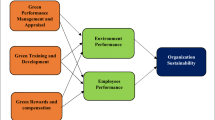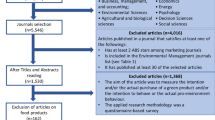Abstract
The topic of green human resource management has attracted considerable attention during this last decade. Despite this interest, little research has been conducted to explore the successful implementation of green human resource management to achieve environmental sustainability goals. Therefore, this study aims to identify the factors affecting the effective implementation of green human resource management in petrochemical companies in Bushehr City. This research is the first article that has evaluated green human resource management measures in petrochemical industries, and on the other hand, it can be stated that it is the first paper to perform green measures of human resource management using the combined method of fuzzy hierarchical analysis and type-2 fuzzy DEMATEL. The present study seeks to identify these factors and examine their relationships based on existing theoretical foundations and expert opinions. Based on results, factors affecting green human resource management implementation were divided into five categories: recruitment and employment, training and development, performance appraisal, service compensation and reward, and green organizational culture management. In other words, a total of five criteria and twenty green sub-criteria were identified for the implementation of green human resource management. Fuzzy AHP and type-2 fuzzy DEMATEL were applied to determine the weights of the criteria. The results showed that the process of green training and development is the most critical factor in the effective implementation of green human resource management. Also, training and development processes, service compensation, and green organizational culture management are affecting factors to achieve this critical issue. In order to implement green human resource management, this study has proposed the priority of green measures for petrochemical industry managers.



Similar content being viewed by others
Data availability
The data that support the findings of this study are available from the corresponding author upon reasonable request.
References
Abdullah L, Zulkifli N (2015) Integration of fuzzy AHP and interval type-2 fuzzy DEMATEL: an application to human resource management. Expert Syst Appl 42(9):4397–4409
Amrutha VN, Geetha SN (2020) A systematic review on green human resource management: implications for social sustainability. J Clean Prod 247:119131
Anwar N, Mahmood NHN, Yusliza MY, Ramayah T, Faezah JN, Khalid W (2020) Green human resource management for organizational citizenship behavior towards the environment and environmental performance on a university campus. J Clean Prod 256:120401
Benevene P, Buonomo I (2020) Green human resource management: an evidence-based systematic literature review. Sustainability 12(15):5974
Darvishmotevali M, Altinay L (2022) Green HRM, environmental awareness and green behaviors: the moderating role of servant leadership. Tourism Manag 88:104401
Chou YC, Sun CC, Yen HY (2012) Evaluating the criteria for human resource for science and technology (HRST) based on an integrated fuzzy AHP and fuzzy DEMATEL approach. Appl Soft Comput 12:64–71
Dubey R, Gunasekaran A, Childe SJ, Papadopoulos T, Hazen B, Giannakis M, Roubaud D (2017) Examining the effect of external pressures and organizational culture on shaping performance measurement systems (PMS) for sustainability benchmarking: some empirical findings. Int J Prod Econ 193:63–76
Dumont J, Shen J, Deng X (2017) Effects of green HRM practices on employee workplace green behavior: the role of psychological green climate and green employee values. Hum Resour Manage 56(4):613–627
Fawehinmi O, Yusliza MY, Mohamad Z, Noor Faezah J, Muhammad Z (2020) Assessing the green behaviour of academics: the role of green human resource management and environmental knowledge. Int J Manpower 41(7):879–900
Gupta H (2018) Assessing organization’s performance on the basis of GHRM practices using BWM and Fuzzy TOPSIS. J Environ Manage 226:201–216
Gusmerotti NM, Testa F, Macellari M, Frey M (2020) Corporate social responsibility embeddedness through a social network analysis: the case of an Italian multiutility company. Corp Soc Responsib Environ Manag 27(2):455–469
Haldorai K, Kim WG, Garcia RF (2022) Top management green commitment and green intellectual capital as enablers of hotel environmental performance: the mediating role of green human resource management. Tourism Manag 88:104431
Kim A, Kim Y, Han K, Jackson SE, Ployhart RE (2017) Multilevel influences on voluntary workplace green behavior: individual differences, leader behavior, and coworker advocacy. J Manag 43(5):1335–1358
Kim YJ, Kim WG, Choi HM, Phetvaroon K (2019) The effect of green human resource management on hotel employees’ eco-friendly behavior and environmental performance. Int J Hosp Manag 76:83–93
Lamm E, Tosti-Kharas J, King CE (2015) Empowering employee sustainability: perceived organizational support toward the environment. J Bus Ethics 128(1):207–220
Marin-Garcia JA, Tomas JM (2016) Deconstructing AMO framework: a systematic review. Intangible Capital 12(4):1040–1087
Marrucci L, Daddi T, Iraldo F (2021) The contribution of green human resource management to the circular economy and performance of environmental certified organisations. J Clean Prod 319:128859
Masri HA, Jaaron AA (2017) Assessing green human resources management practices in Palestinian manufacturing context: an empirical study. J Clean Prod 143:474–489
Mtutu P, Thondhlana G (2016) Encouraging pro-environmental behavior: energy use and recycling at Rhodes University, South Africa. Habitat Int 53:142–150
Muisyo PK, Qin S (2021) Enhancing the FIRM’S green performance through green HRM: the moderating role of green innovation culture. J Clean Prod 289:125720
Mustapha MA, Manan ZA, Alwi SRW (2017) Sustainable Green Management System (SGMS)–an integrated approach towards organizational sustainability. J Clean Prod 146:158–172
Nejati M, Rabiei S, Jabbour CJC (2017) Envisioning the invisible: understanding the synergy between green human resource management and green supply chain management in manufacturing firms in Iran in light of the moderating effect of employees’ resistance to change. J Clean Prod 168:163–172
Nisar QA, Haider S, Ali F, Jamshed S, Ryu K, Gill SS (2021) Green human resource management practices and environmental performance in Malaysian green hotels: the role of green intellectual capital and pro-environmental behavior. J Clean Prod 311:127504
O’Donohue W, Torugsa N (2016) The moderating effect of ‘Green’HRM on the association between proactive environmental management and financial performance in small firms. Int J Human Resour Manag 27(2):239–261
Paillé, P., Valéau, P., & Renwick, D. W. (2020). Leveraging green human resource practices to achieve environmental sustainability. J Clean Prod 121137
Rajabpour, Ebrahim. (2017). The effects of human resource management on environmental management development. Journal of Research in Human Resource Management, Imam Hussein University, 1 (27), 51–74 (in-Persian)
Rajabpour, Ebrahim., Afkhami Ardakani, Mehdi (2020). The relationship between green human resource management and green supply chain management, Journal of HUMAN RESOURCE MANAGEMENT IN THE OIL INDUSTRY. 11 (44), 317–342 (in-Persian)
Ramasamy A, Inore I, Sauna R (2017) A study on implications of implementing green HRM in the corporate bodies with special reference to developing nations. Int J Bus Manag 12(9):117
Rubel, M. R. B., Kee, D. M. H., & Rimi, N. N. (2021). Green human resource management and supervisor pro-environmental behavior: the role of green work climate perceptions. J Clean Prod 127669
Ren S, Tang G, Jackson SE (2018) Green human resource management research in emergence: a review and future directions. Asia Pacific Journal of Management 35(3):769–803
Renwick DW, Redman T, Maguire S (2013) Green human resource management: a review and research agenda. Int J Manag Rev 15(1):1–14
Pham NT, Thanh TV, Tučková Z, Thuy VTN (2020) The role of green human resource management in driving hotel’s environmental performance: interaction and mediation analysis. Int J Hospitality Manag 88:102392
Sharma, S., & Gupta, N. (2015). Green HRM: an innovative approach to environmental sustainability. In Proceeding of the Twelfth AIMS International Conference on Management (pp. 2–5).
Sharma S, Prakash G, Kumar A, Mussada EK, Antony J, Luthra S (2021) Analysing the relationship of adaption of green culture, innovation, green performance for achieving sustainability: mediating role of employee commitment. J Clean Prod 303:127039
Tang G, Chen Y, Jiang Y, Paille P, Jia J (2018) Green human resource management practices: scale development and validity. Asia Pacific Journal of Human Resources 56(1):31–55
Teixeira AA, Jabbour CJC, de Sousa Jabbour ABL, Latan H, De Oliveira JHC (2016) Green training and green supply chain management: evidence from Brazilian firms. J Clean Prod 116:170–176
Tooranloo HS, Azadi MH, Sayyahpoor A (2017) Analyzing factors affecting implementation success of sustainable human resource management (SHRM) using a hybrid approach of FAHP and Type-2 fuzzy DEMATEL. J Clean Prod 162:1252–1265
Úbeda-García M, Claver-Cortés E, Marco-Lajara B, Zaragoza-Sáez P (2021) Corporate social responsibility and firm performance in the hotel industry. The mediating role of green human resource management and environmental outcomes. J Bus Res 123:57–69
Upadhyay, P., & Kumar, A. (2020). The intermediating role of organizational culture and internal analytical knowledge between big data analytics capability and a firm's performance. International Journal of Information Management, 102100.
Wikhamn W (2019) Innovation, sustainable HRM, and customer satisfaction. Int J Hosp Manag 76:102–110
Yusliza, M. Y., Norazmi, N. A., Jabbour, C. J. C., Fernando, Y., Fawehinmi, O., & Seles, B. M. R. P. (2019). Top management commitment, corporate social responsibility and green human resource management: a Malaysian study. Benchmarking: An International Journal, 26(6), 2051 – 2078.
Zaid AA, Jaaron AA, Bon AT (2018) The impact of green human resource management and green supply chain management practices on sustainable performance: an empirical study. J Clean Prod 204:965–979
Zheng G, Zhu N, Tian Z, Chen Y, Sun B (2012) Application of a trapezoidal fuzzy AHP method for work safety evaluation and early warning rating of hot and humid environments. Saf Sci 50(2):228–239
Author information
Authors and Affiliations
Contributions
Ebrahim Rajabpour: ideas, conceptualization, data curation, methodology, and writing. Mohammad Reza Fathi: supervision, formal analysis, investigation, and resources. Mohsen Torabi: investigation, methodology, data curation, and writing—review and editing.
Corresponding author
Ethics declarations
Ethics approval
Not applicable.
Consent to participate
Not applicable.
Consent for publication
Not applicable.
Conflict of interest
The authors declare no competing interests.
Additional information
Responsible Editor: Philippe Garrigues
Publisher's Note
Springer Nature remains neutral with regard to jurisdictional claims in published maps and institutional affiliations.
Rights and permissions
About this article
Cite this article
Rajabpour, E., Fathi, M.R. & Torabi, M. Analysis of factors affecting the implementation of green human resource management using a hybrid fuzzy AHP and type-2 fuzzy DEMATEL approach. Environ Sci Pollut Res 29, 48720–48735 (2022). https://doi.org/10.1007/s11356-022-19137-7
Received:
Accepted:
Published:
Issue Date:
DOI: https://doi.org/10.1007/s11356-022-19137-7




